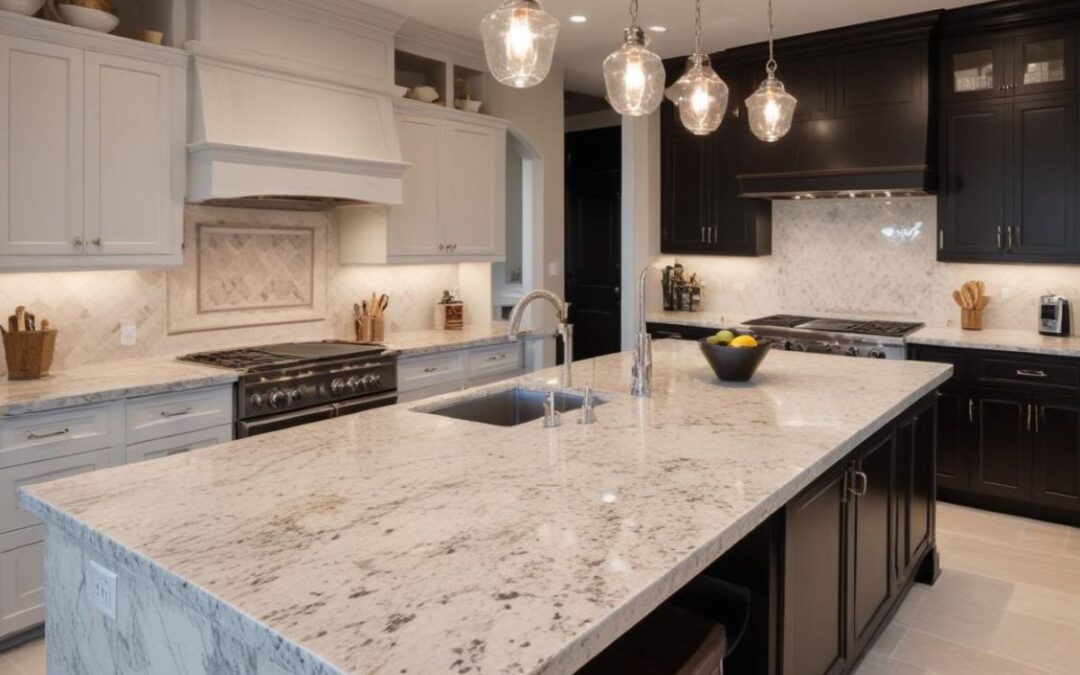Regarding kitchen countertops, homeowners often face a difficult decision: granite or quartz? Both materials offer stunning aesthetics and practical benefits but differ in composition, maintenance, cost, and overall performance.
In this blog, we’ll break down the key differences between granite and quartz to help you choose the best kitchen renovation. Let’s get started!
1. Natural vs. Engineered Stone
The most significant distinction between granite and quartz lies in their composition. Granite is a natural stone mined from quarries and cut into slabs. Each slab is unique, with variations in color, pattern, and texture, which lends a one-of-a-kind quality to every installation.
Quartz, on the other hand, is an engineered stone. It’s made from natural quartz crystals (about 90-95%) combined with resins and pigments. This manufacturing process produces a uniform appearance with consistent colors and patterns, offering more control over design.
2. Aesthetic Appeal
Granite’s natural beauty is one of its most attractive features. Because no two slabs are identical, granite countertops offer distinct, organic patterns. The variations are endless, from speckled to veined, light to dark, bringing a sense of luxury and uniqueness to any kitchen.
While engineered, quartz offers a sleek and modern aesthetic. With a wide range of colors and finishes, including options that mimic marble or natural stone, quartz can fit almost any design style. Its consistency is ideal for homeowners who want a more uniform look throughout their kitchen.
3. Durability
Granite and quartz are highly durable but perform slightly differently under daily use.
- Granite is a naturally hard stone, making it resistant to scratches, heat, and cuts. However, because it is porous, it can absorb liquids, leading to potential staining if not properly sealed and maintained. Regular resealing (every 1-3 years) is necessary to keep granite countertops in good condition.
- Quartz, being non-porous, does not require sealing and is more resistant to stains from substances like wine, coffee, or oils. It’s also less susceptible to cracking or chipping compared to granite. However, quartz is not as heat-resistant as granite, so placing hot pots directly on the surface can damage it.
4. Maintenance
Maintenance is a significant factor for many homeowners when choosing countertops. Granite requires more upkeep due to its porous nature. Sealing the surface every few years is essential to prevent staining and bacterial growth. Cleaning is simple with mild soap and water, but acidic or abrasive cleaners should be avoided.
Quartz is virtually maintenance-free. Its non-porous surface doesn’t need sealing, and regular cleaning with soap and water is sufficient to keep it looking fresh. Because it resists stains and bacteria more effectively, quartz is ideal for busy households looking for minimal maintenance.
5. Cost Considerations
Price is often a deciding factor, and both granite and quartz can vary in cost depending on quality and design. Typically, granite tends to be slightly less expensive than quartz, although this can change depending on the granite slab’s rarity or the quartz design’s complexity.
- Granite prices can range from $40 to $100 per square foot installed, depending on the quality and origin of the stone.
- Quartz is generally priced between $50 to $120 per square foot installed. While slightly more expensive, quartz’s low-maintenance benefits may justify the additional cost for many homeowners.
6. Environmental Impact
If sustainability is a priority for you, both materials have environmental considerations. Granite is a natural resource that requires mining and transportation, which can contribute to its carbon footprint. However, some manufacturers focus on sourcing granite responsibly from quarries with sustainable practices.
Quartz countertops, while made from natural materials, require energy-intensive manufacturing processes due to the resin and pigments involved. However, many quartz brands now prioritize eco-friendly production, using recycled materials and reducing waste during manufacturing.
7. Which One Should You Choose?
Choosing between granite and quartz ultimately depends on your preferences and lifestyle needs.
- Choose Granite if you love the look of natural stone with unique, organic patterns and you don’t mind the occasional resealing and maintenance. Granite is perfect for those who want a luxurious and timeless countertop.
- Choose Quartz if you prefer a modern, uniform appearance with minimal upkeep. If stain resistance and easy maintenance are priorities, quartz is an excellent choice, especially for busy kitchens or families with young children.
Conclusion
Both granite and quartz have their advantages, and neither is inherently better than the other. The best choice for your kitchen depends on your design vision, maintenance preferences, and budget. Whether you’re drawn to the natural beauty of granite or the sleek durability of quartz, either material will provide a stunning and functional centerpiece to your kitchen for years to come.
Consider Supremestones For Exotic & High-Quality Natural Stones in Houston, TX
We’ve got you covered if you’re looking for the highest quality exotic natural stones in Houston. We are Houston’s leading importer and wholesale distributor of premium quality exotic stones worldwide. We pride ourselves on providing the best quality granite, marble, quartz, soapstone, crystal, and dolomite. Contact us today!

